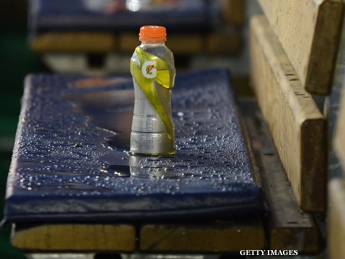
Nearly 200,000 people have signed an online petition started by a Mississippi teen, which calls for Gatorade to remove a synthetic chemical from some of its drinks.
Sarah Kavanagh of Hattiesburg, Miss., was interested to learn more about brominated vegetable oil (BVO), an ingredient in Gatorade Thirst Quencher Orange. When she did an online search of the chemical, she learned that it has been patented by many companies as a flame retardant and is banned in Europe and Japan.
Gatorade uses BVO to keep the drink mixed. Without the chemical, the citrus flavor would rise to the top of the drink.
"I have always been a fan of Gatorade, but I'm also really inquisitive and a health-conscious person," Kavanagh told the New York Daily News. "One day I looked up the ingredients, and I was just shocked."
Kavanagh found an article by Scientific American that explored the extent that drink makers are using BVO and the possible effects.
BVO is legal in the United States, but the Food and Drug Administration (FDA) limits the amount in a beverage to 15 parts per million.
Responding to Kavanagh's petition, a Gatorade spokewoman told BeverageDaily.com, "We take consumer safety and product integrity seriously, and we can assure you that Gatorade is safe."
An examination of several other popular sports and energy drinks reveals that they too may have questionable ingredients.
Another common stabilizer used in sports drinks, including Powerade, is glycerol ester of wood rosin, which includes traces of actual wood rosin. But like BVO, wood rosin is approved for use in small amounts.
5-Hour-Energy, a popular energy drink which has been cited for possible involvement in 13 deaths during the past four years, contains high levels of certain B vitamins and an amino acid called taurine. Our bodies naturally create taurine, and some scientists worry that the influx of the chemical in energy drinks can have dangerous consequences.
Even popular sodas may have suspicious chemicals, although recent findings have been disputed by the FDA. In March, the Center for Science in the Public Interest found high levels of the animal carcinogen 4-methylimidazole in Coca-Cola and Pepsi cola drinks.
The FDA has said that the chemical, which helps give the drinks their color, is found in such low concentrations that a human would have to consume more than a thousands cans of the drink in a day to reach dangerous levels.
Diet Sodas are not entirely safe either. The common artificial sweetener aspartame has been linked to obesity and may even be a carcinogen.




